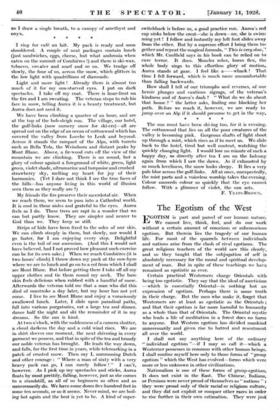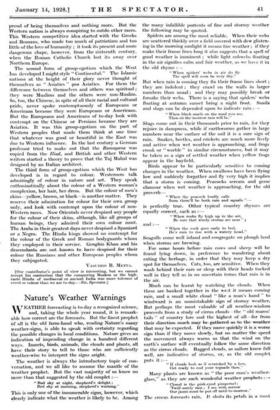The Egotism of the West
EGonsm is part and parcel of our human nature: We cannot live, think, feel, and do our work without a certain amount of conscious or subconscious egotism. But therein lies the tragedy of our human life. For most of the quarrels between individuals and nations arise from the clash of rival egotisms. The great religious teachers of the world saw this clearly, and so they taught that the subjugation of self is absolutely necessary for the moral and spiritual develop- ment of man. But in spite of these teachings we have remained as egotistic as ever.
Certain practical Westerners charge Orientals with being too egotistic. They say that the ideal of asceticism —which is essentially Oriental—is nothing but an expression of egotism. Perhaps there is some truth in their charge. But the men who make it, forget that Westerners are at least as egotistic as the Orientals ; and that their egotism is far more harmful to humanity as a whole than that of Orientals. The Oriental mystic who leads a life of meditation in a forest does no harm to anyone. But Western egotism has divided mankind unnecessarily and given rise to hatred and resentment all over the world.
I shall not say anything here of the ordinary "individual egotism "—if I may so call it—which a Westerner possesses in common with other human beings. I shall confine myself here only to those forms of "group egotism" which the West has evolved—forms which were more or less unknown in other civilizations.
Nationalism is one of these forms of group-egotism: It- does not exist in the East. The Chinese, Indians; or Persians were never proud of themselves as " nations " 3 they were proud only of their racial or religious culture, and they did not exploit or conquer other races in order to rise further in their own estimation. They were just proud of being themselves and nothing more. But the Western nation is always conspiring to outdo other races. This Western competitive idea started with the Greeks and Romans, who made too much of patriotism and too little of the love of humanity ; it took its present and more dangerous shape, however, from the sixteenth century, when the Roman Catholic Church lost its sway over Northern Europe.
The second form of group-egotism which the West has developed I might style "Continental." The Islamic nations at the height of their glory never thought of themselves as " Asiatics " qua Asiatics. For them the difference between themselves and others was spiritual ; they were Muslims and the others were non-Muslim. So, too, the Chinese, in spite of all their racial and cultural pride, never spoke contemptuously of Europeans or Americans because they were Europeans or Americans. But the Europeans and Americans of to-day look with contempt on the Chinese or Persians because they are Asiatics. It was this group-egotism on the part of Western peoples that made them think at one time that whatever was good or beautiful in the East was due to Western influence. In the last century a German professor tried to make out that the Ramayana was copied from the Iliad, and British and other Western .writers started a theory to prove that the Taj Mahal was designed by an Italian architect.
The third form of group-egotism which the West has developed is in regard to colour. Westerners talk admiringly of colour in nature and art. They speak enthusiastically about the colour of a Western woman's complexion, her hair, her dress. But the colour of men's skins—yellow, brown, or black—is another matter. They reserve their admiration for colour for their own group only, and look with contempt upon the colour of non- Western races. Now Orientals never despised any people for the colour of their skins, although, like all groups of human beings, they admired their own colour most. The Arabs in their greatest days-never despised a Spaniard or a Negro. The Hindu kings showed no contempt for the colour of the Greek and Roman bodyguards whom they employed iii their service. Genghiz-Khan_ and his descendants. are not known to-have despised -for their colour the Russians and other European peoples whom they subjugated.
VASUDEO B. METTA.
[Our contributor's point of view is interesting, but we cannot accept his contention that the conquering Moslem or the high. caste Hindu of mediaeval or ancient India was more tolerant of creed or colour than we are to-day.—ED. Spectator.]



































 Previous page
Previous page